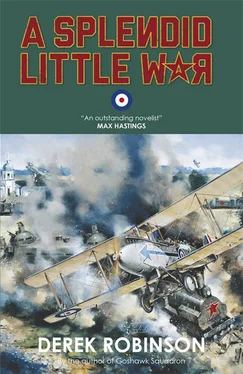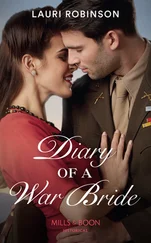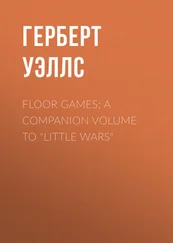“To the General Commanding, British Military Mission H.Q. Urgent. Merlin Squadron R.A.F. requests permission to bomb Moscow. Signed, Brazier, captain, adjutant.”
“Simple.” Lacey put on his headphones. “Neat but not gaudy. I think I can manage that.
3
The C.O. and Tusker Oliphant reached a compromise. Each bomber would carry an observer-gunner, but they would be the smallest, lightest men in the Flight. Cans of petrol, equivalent to the savings in weight, would be packed into their cockpits. There would be a trial flight and landing to see how the refuelling worked.
“Just to make it more realistic,” the C.O. said, “and seeing that we have so many ground crews doing nothing, they can be the Red Army.”
“Firing realistic rifles?” Oliphant said. “I hope not.”
“Blank rounds. And your gunners can have blanks in their Lewis guns. Don’t worry. I’ll stage-manage it.”
The Nines, loaded to the maximum with fuel and bombs, laboured into the air and made two careful circuits. They landed into the wind, turned, taxied to the other end, turned again and killed their engines. Oliphant and Gunning scrambled out and stood on the lower wings. Their observers heaved up cans.
“Heavy weather,” Jessop said. He was watching from a distance. “No handles on those cans. Petrol’s heavy. And you need a big funnel to get it into the tank.”
“They forgot the funnels,” Wragge said. “Lesson one.”
“Where’s the Red Army? Honestly, the Bolos are a disgrace.”
“Hiding in the woods.”
When the first can was empty and flung aside, and the pilots and observers were struggling with the second, the C.O. fired a red signal flare. The attack began. The ground crews came from many different points. Their rifles made noise and smoke. They shouted profane abuse. They enjoyed themselves enormously. The observers’ Lewis guns doubled the uproar. The pilots emptied the second can and shouted for a third, but the observers could not fire the Lewis and hoist another can.
There was no option but to escape. The pilots got into their cockpits and the observers got out to swing the propellers. All this took time. The Lewis guns were silent. The ground crews raced across the field and captured the Nines. They took pleasure in marching the crews to the C.O.
“Lessons to be learned,” Wragge said.
“Yes,” Oliphant said. His trousers were soaked. “Forget refuelling.”
“Well, there was only one way to find out. Frankly, I never had much faith in it. And it doesn’t affect the basis of the operation, does it?” He saw the adjutant watching him. “Hullo, Uncle. The Army trounced us today, didn’t it? Only a little experiment. Nothing serious.”
Brazier held up a piece of paper. “This calls for your attention, sir.” The sir surprised Wragge. Only the Other Ranks called him sir. He and Brazier walked away from the crowd. Brazier gave him the paper. It was a signal from the General Commanding at Mission H.Q. Permission denied , it said. No aircraft is permitted to bomb Moscow under any circumstances whatever .
“This can’t be right,” Wragge said. “Only a fool would throw away an opportunity like this. A fool and a coward.” He thrust the signal at Brazier. “Reply immediately. Request clarification. Now.” His brain caught up with events. “Who did this? Somebody told him. Who told him?”
“I did.” Brazier folded the signal and tucked it into a tunic pocket. “You could put me under close arrest for exceeding my authority, sir. Or you could bomb Moscow without permission and face court martial yourself. I chose the lesser offence. For the good of the squadron.” Wragge was silent.
Brazier walked back to his Orderly Room. Within the hour, the C.O. got his reply. The General Commanding in H.Q. also believed in Referring to a Higher Authority. Air Ministry in London categorically refused permission for any R.A.F. unit to bomb Moscow. In the interests of clarity, this meant Merlin Squadron R.A.F. must not repeat not bomb Moscow.
Wragge turned the signal into a paper glider and made it fly. “Sometimes it’s a privilege to be court-martialled, Uncle. Did you ever think of that?” Brazier said nothing, and Wragge walked away. He went to his Camel. “Full tanks?” he asked his fitter.
“Half-full, sir.”
“Good enough. I’ll take her up.” He got in.
He climbed until the airfield was out of sight. All he had for company were some fluffy clouds. He tested the Camel with every aerobatic trick he knew. If his ground crew had done their job, nothing would break. On the other hand, they couldn’t see inside every spar and wire and yard of fabric. Nothing broke. Some parts creaked and the wings flexed more than usual, but nothing actually snapped. He ended the flight at slightly above ground level, vaulting over trees, sometimes squeezing between trees, and landed as delicately as a dancer.
Oliphant met him. “Alright?” he said.
“Perfectly.”
“We thought you might have gone off and done a Griffin.”
“Not me. Anyway, I couldn’t find anyone to fight.”
“Bloody Bolos. Let you down every time. I heard the news.”
“It’s a stupid war, Tusker. H.Q. doesn’t know whether it’s fighting or farting. Well, to hell with Taganrog. To hell with London. And to hell with Moscow. Tonight we’ll throw the biggest party this unlucky squadron has ever had.”
“First sensible order you’ve given,” Oliphant said.
1
Three days later, the Red Army launched a surprise assault, with fresh troops, and crossed the river at a rush.
By midday the squadron’s trains were rolling south while the aircraft flew on ahead of them. The pilots were waiting, on the beautiful green field as big as Lord’s cricket ground, when the trains pulled into the rusty spur line. It was dusk. Travel had been painfully slow. The tracks were crowded with trains — troop trains, hospital trains, refugee trains — all going south. That was to be the story of Merlin Squadron for the next month.
Lacey strung his aerials and failed to make contact with Denikin’s staff but a signal from Mission H.Q. referred to “a temporary reverse”. He tried again next day and told the C.O. that reportedly the White armies were making a strategic withdrawal to strong defensive positions. “The Red Army claims to have captured Orel,” he said.
Borodin walked to the main line and talked to some staff officers whose train was waiting for signals to change. He came back to The Dregs. “They say that the Reds are fighting like dervishes, not that they know what a dervish fights like. What really depressed them was the new Red uniform. All their troops have it. Even boots. And good food too. Some of Denikin’s units mutinied so they could join the Reds and eat.”
“But we had them beaten,” Jessop said. “What happened?”
“Russia is a big country. And now their supply lines are very short while ours are very long.”
“Uncle,” Wragge said. “Kindly ask the plennys to dig up that memorial to Hopton and Blythe. We’re not leaving it here.”
He waited. On the third day the traffic on the main line thinned to a trickle, which was a bad sign. The squadron trains moved south again, sluggishly, passing the capsized ruin of the Bolo armoured train. Smoke was still drifting over Kursk, but there was little left to burn. The machines had already landed at the field where the dead horses had been piled into the shell crater.
The squadron ran out of tinned fruit, oatmeal, butter and dried peas.
During the night, all the plennys except Chef deserted.
Sounds of battle could be heard, probably in Kursk. No orders from Denikin’s staff reached the squadron. Wragge decided to get out before he was overrun. The aircraft flew south, to the racetrack. General Gregorioff and his gout had left. The squadron trains did not arrive for three days. The pilots and observers lived on roast rabbit (shot with Service revolvers), mushrooms, wild strawberries, and a fat pheasant which had been too slow to avoid Jessop’s Camel as he landed. They slept badly: the nights were cold.
Читать дальше











